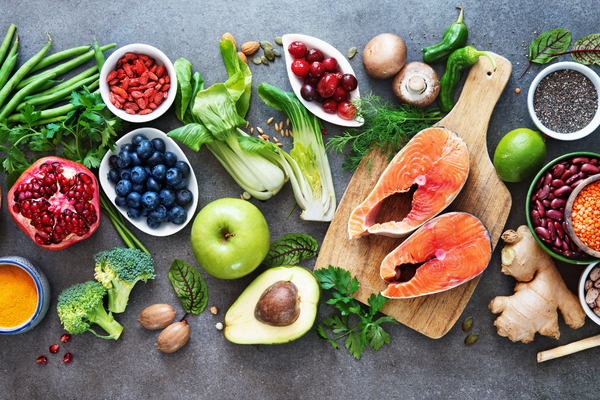Nutrition is one of the most important aspects of fitness.
If you're eating a balanced diet, it'll help your body recover after a tough workout, keep your muscles strong and healthy, and give you lots of energy so you can keep pushing yourself.
On the other hand, if your diet isn't balanced or consistent enough to support regular exercise routines, then it won't matter how hard you work out—you'll just be wasting time at the gym!
So let's talk about what good nutrition really means for people who want to get and stay fit.
What is nutrition?
Nutrition is the process of eating and drinking.
But that’s not what nutrition really means.
The word "nutrition" actually refers to the fuel your body needs to function properly. It’s like gas for a car, or electricity for a light bulb, or water for plants (in case you didn't know, plants are living things too!).
Your body uses nutrients to build and repair tissues like muscles, skin, hormones and enzymes. You can also get energy from them so you can stay active throughout your day!
Nutrition helps fuel your workouts
Nutrition is an important component of your workout routine. It can help fuel you to run faster, lift heavier weights, and perform better in other ways. To make sure that you are getting the most out of both nutrition and exercise, it is important to understand the process by which food fuels your body.
The body uses three macronutrients (carbohydrates, fats and proteins) for energy production. Carbohydrates are broken down into glucose molecules during digestion and absorbed into the bloodstream as glucose-to-be used as energy by our bodies’ cells. When we eat carbohydrates they get converted into glycogen stores within our muscles which act as an immediate source of energy when needed during exercise – this process also helps prevent blood sugar levels from rising too high or falling too low between meals/snacks throughout the day!
Protein on the other hand contributes only partially towards providing us with calories; however its function is much more profound than simply providing us with another way of getting extra protein without having to eat meat all day long (which would probably be pretty boring).
Protein helps build muscle.
Protein is the building block of muscle. In order to build or repair muscle, you need protein. Protein can be found in meat, fish, eggs and dairy products. Plant protein powders are another option if you're not a fan of animal products.
How much protein do you need? The answer depends on your age, gender, weight and activity level. The recommended daily allowance for adults is 0.8 grams per kilogram of body weight (1 kilogram equals about 2 pounds). People who are very active may require 1-2 grams per kilogram of body weight per day.
Healthy fats help your heart and brain.
Healthy fats are vital for good health.
- They help reduce the risk of coronary heart disease and stroke.
- Healthy fats help you lose weight, especially when combined with a low-carb diet (which we'll discuss later).
- Your brain is 60 percent fat, so it needs healthy fats to function properly!
Carbohydrates are our bodies' main energy source.
Carbohydrates are the body's main energy source. They're broken down to glucose (blood sugar) and then converted into a type of fuel called glycogen, which is stored in our muscles and liver until we need it. Carbohydrates come in many forms: sugars like sucrose (table sugar) or high-fructose corn syrup; starch, which is found in breads and pasta; and fibre, found in fruits and vegetables.
Carbs have gotten a bad rap because they're often associated with fattening—but carbs themselves aren't necessarily bad for you. In fact, they are an important part of any healthy diet! Most people should get between 45-65 percent of their daily calories from carbohydrates. For example: if you usually eat 2,000 calories per day (the recommended amount), that means getting at least 900 of those calories from carbs each day will help keep your body fueled properly throughout the day
Water helps you lose weight and keep it off.
Water is a calorie-free beverage, and it can help you lose weight. Water can help keep you hydrated and avoid dehydration, which may lead to hunger cravings, digestive problems such as constipation or sluggish digestion, kidney function problems and even high blood pressure.
Consistent, balanced nutrition is essential for good health and fitness.
Nutrition is critically important for everyone, not just athletes. It's a vital component of good health and fitness, and the key to achieving your goals.
Nutrition can help you achieve your fitness goals by providing the fuel you need to train hard, recover properly, and get stronger. But nutrition can also help prevent disease in many other ways:
- Eating a healthy diet rich in fruits and vegetables may lower your risk of heart disease or stroke by reducing blood pressure and cholesterol levels.
- A diet that includes lean protein may help control weight gain because it keeps you feeling full longer than low-calorie foods do.
- Some people who have high blood pressure should reduce their salt intake (sodium) by avoiding salty foods such as fast food or canned soups containing sodium chloride (table salt).
Conclusion
We hope that this article has helped you understand the basics of nutrition. Nutrition is one of the key components of overall health and fitness, so it's important that you learn how to make good decisions when it comes to what you eat and drink.



